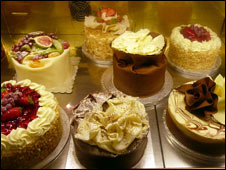
William: Hello, and welcome to the English We Speak, I'm William.
威廉:大家好,歡迎收聽地道英語節(jié)目,我是威廉。
Yang Li: And I'm Yang Li…
楊莉:我是楊莉……
William: And your task, Yang Li, is to guess today's word, OK?
威廉:楊莉,你來猜猜今天要講什么短語吧?
Yang Li: OK.
楊莉:好的。
William: Awesome. Li, try some of this cake…
威廉:太好了。莉,來嘗嘗這塊蛋糕……
Yang Li: A cake? Oh, thanks! That's very nice…
楊莉:蛋糕?哦,謝謝你。太好了……
William: Do you like it? Awesome. They're pretty awesome cakes, huh?!
威廉:你喜歡嗎?太棒了。蛋糕很好吃,對(duì)吧?
Yang Li: Yes, and I think I know what this week's word is. It's…
楊莉:對(duì),我想我知道這周要講的詞了。就是……
William: Hang on Li, try some of this coffee as well–it's really…
威廉:莉,等等,再來嘗嘗這杯咖啡,它非常……
Yang Li: Awesome?
楊莉:棒?
William: Exactly-it's really awesome. You got it. So listen to this. Which three adjectives are used in this clip?
威廉:沒錯(cuò),真的非常棒。你已經(jīng)學(xué)會(huì)了。來聽聽下面的例子。在這個(gè)片段中用了哪三個(gè)形容詞?
Example
例子
This party is awesome. The food is amazing. The wine is excellent.
這個(gè)派對(duì)太棒了。食物非常好吃。紅酒也很美味。
Yang Li: Awesome, amazing and excellent.
楊莉:三個(gè)形容詞為太棒了,令人驚嘆和妙極了。
William: That's right. Awesome means excellent or amazing.
威廉:沒錯(cuò)。Awesome就是太棒了,令人驚嘆的意思。
Yang Li: Awesome. This word has existed in English for a long time, hasn't it?
楊莉:太棒了。這個(gè)詞由來已經(jīng)久,對(duì)吧?
William: Yes, and it used to mean awe-inspiring. So awe means great respect or admiration, so something that’s awesome or awe-inspiring makes you feel great respect and admiration.
威廉:對(duì),原本的意思是令人感到驚嘆。awe的意思是非常尊敬或欽佩,所以如果用來形容某樣?xùn)|西就是說那個(gè)東西讓你尊重且贊賞。
Yang Li: Full of respect and admiration. But now it just means cool?
楊莉:滿含敬畏和贊賞。但是現(xiàn)在只有太棒了這個(gè)意思嗎?
William: Exactly, and that’s thanks to the influence of American slang. So the word can now be used to describe almost anything.
威廉:沒錯(cuò),這是由于受到美國俚語的影響。所以這個(gè)詞幾乎可以用來形容任何事物。
Examples
例子
These shoes are awesome.
這些鞋子太漂亮了。
This is an awesome radio programme.
這檔廣播節(jié)目太精彩了。
Wow! You are awesome at singing, mate!
哇!伙計(jì),你唱得太棒了!
William: And there is one slightly different usage of this word. Listen to this.
威廉:這個(gè)詞還有一種不同的用法。來聽這個(gè)例子。
Example
例子
A: Are you free to come for hotpot tonight?
A:你今晚有時(shí)間來吃火鍋嗎?
B: Yes, I should be.
B:有,我會(huì)去的。
A: Awesome. That makes four of us!
A:太好了。這樣我們就有四個(gè)人了!
William: So what does awesome mean in that clip, Li?
威廉:莉,awesome在剛才的例子中是什么意思?
Yang Li: It's like when we say 'great' at the beginning of a sentence.
楊莉:和用于句首的great的意思差不多。
William: Well, that's it, yeah, exactly. Awesome can also be used at the beginning of a sentence to indicate agreement or approval.
威廉:嗯,沒錯(cuò),就是這個(gè)意思。Awesome也可以用在句首表示贊同或是認(rèn)可。
Yang Li: Awesome! That's clear now.
楊莉:太好了!現(xiàn)在都弄明白了。
William: Awesome. And that's the end of this awesome programme.
威廉:太好了。我們今天這期精彩的節(jié)目就要結(jié)束了。
Yang Li: William, do you have any cakes left?
楊莉:威廉,你還有蛋糕嗎?
William: Er, just one. Do you want to share it, Li?
威廉:額,只剩一塊了。莉,我們來共享吧?
Yang Li: Awesome. Bye.
楊莉:太好了。再見。
William: Bye.
威廉:再見。











